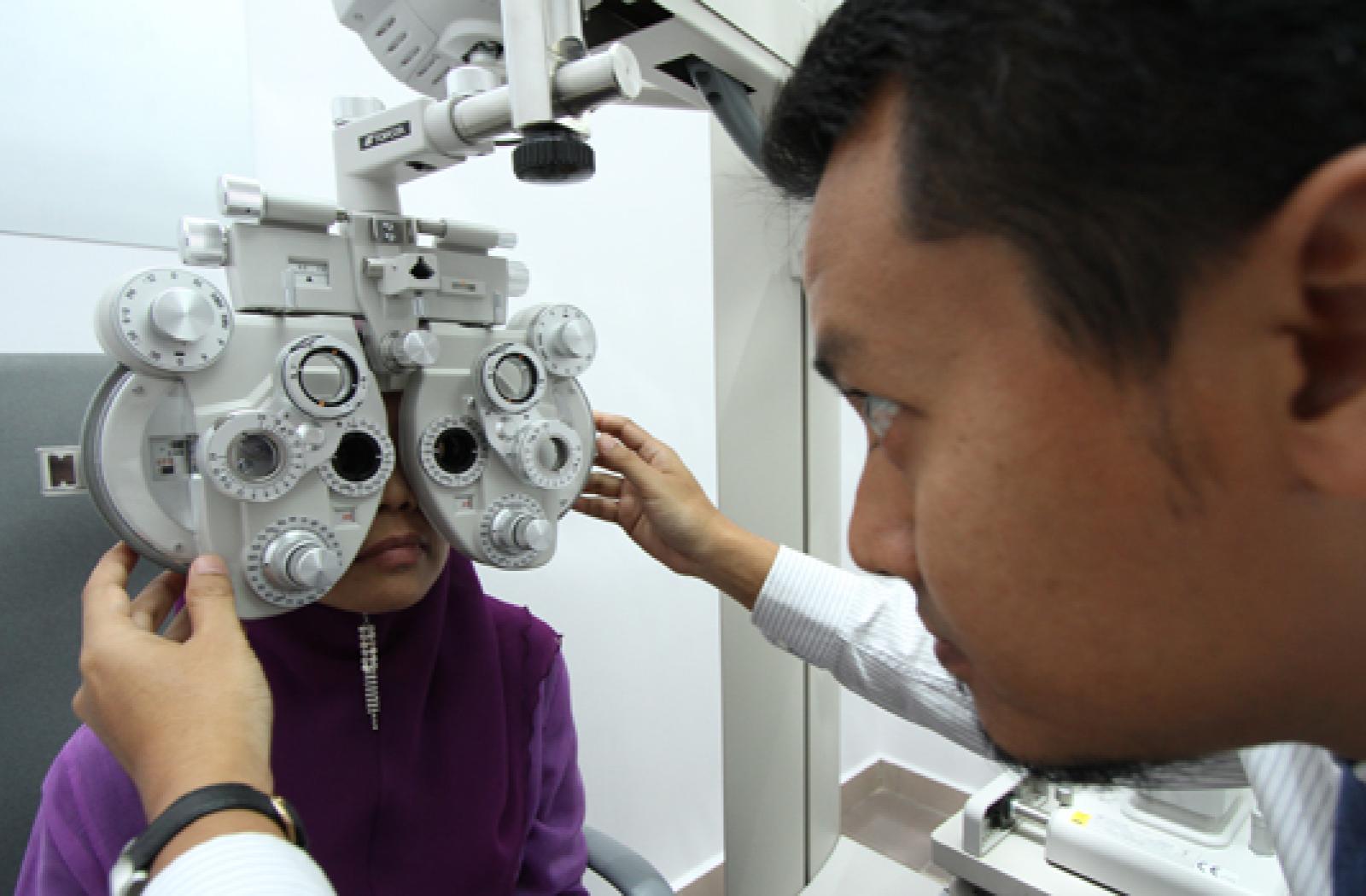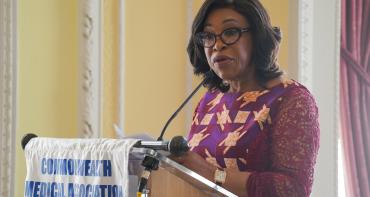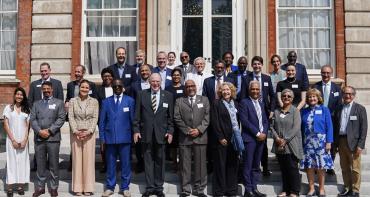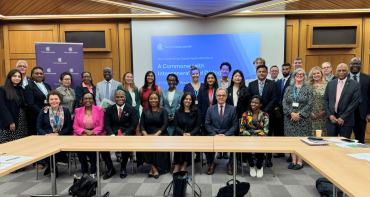As we look towards CHOGM in June where Commonwealth Heads of Government will renew commitments set in 2018 to halve malaria by 2023 and accelerate access to quality eye care for all by 2020, seven countries convened earlier this month to discuss the impact of COVID-19 on malaria and trachoma programmes.

By Dr Janneth Mghamba, Health Advisor, Health Section, Social Policy Development, Economic, Youth and Sustainable Development - Commonwealth Secretariat.
It has been four years since the landmark commitment made by Commonwealth Heads of Government to halve malaria across the Commonwealth by 2023 and accelerate access to quality eye care for all, including eliminating blinding trachoma, by 2020. This commitment has inspired renewed leadership on these two entirely preventable but often neglected diseases.
The momentum of the Sustainable Development Goals has enabled low- and middle-income countries (LMICs) in the Commonwealth to achieve significant improvements in health outcomes over the past two decades. Yet, for many countries, the COVID-19 crisis has hampered the capacity of health systems to deliver essential services and expand access to new services, altering, or in some cases, reversing this positive trend.
According to a World Health Organization report in 2020, moderate disruptions in the delivery of malaria services contributed to an additional 14 million malaria cases and over 69,000 deaths globally. Over two-thirds of those deaths were due to disruptions in the provision of malaria prevention, diagnosis, and treatment.
For trachoma, delays in mass drug administration (MDA) and active case-finding activities due to COVID-19 has hindered the progress made towards eliminating the disease. More widely within the Neglected Tropical Diseases (NTDs) group, the pandemic has resulted in increased morbidity and mortality burden and threatened timelines for international elimination commitments.
Renewed commitments
As we look towards the 2022 Commonwealth Heads of Government Meeting (CHOGM) in June, where commitments that were made at the 2018 CHOGM will be renewed, seven countries convened earlier this month for the second COVID-19 Technical Working Group meeting on Universal Health Coverage (UHC) and Sustaining Health Gains.
Organised by the Commonwealth Secretariat, the meeting was an opportunity for countries to discuss the impact of COVID-19 on malaria and trachoma programmes and included inputs from organisations such as the World Health Organization (WHO), Malaria No More UK, the International Agency for the Prevention of Blindness, and Chatham House.
The meeting, which was Chaired by Dr Theophile Dushime, Chief Technical Advisor to the Rwandan Ministry of Health, also heard from country representatives who shared their challenges, priorities and strategies.
COVID-19 impact on malaria and trachoma
Undoubtedly, our collective progress in eliminating malaria and trachoma has been halted due to the COVID-19 pandemic. The soon-to-be-released 2022 Commonwealth Malaria Report will show that whilst some countries remain on track to reach the commitment of halving malaria deaths by 2023, many countries are falling behind. Unfortunately, this means that the Commonwealth, as a whole, is off trackShare on TwitterDr Theophile Dushime , Chief Technical Advisor to the Rwandan Ministry of Health
Acknowledging the need to regain momentum in malaria and trachoma elimination efforts, Dr Ruth Kattumuri, Senior Director of the Economic, Youth and Sustainable Development Directorate at the Secretariat, added, “If we are to stay true to our words from 2018, the Commonwealth is now tasked with how we return to progress in the fight against malaria and trachoma. Dialogue between countries will be critical for us to build a collective and coordinated effort.”
The longstanding challenges for both trachoma and malaria, many of which pre-date the COVID-19 pandemic, were evident during the roundtable discussion, in which countries shared their perspectives.
In the case of malaria, this included a variety of issues such as plateauing international and domestic financing, increased drug resistance, changes in mosquito biting behaviour, and habitual human behavioural factors. For trachoma, community-based interventions including encouraging behavioural changes and the administration of medicines, remain a persistent challenge.
Underpinning the discussion was the need for strengthening the resilience of health systems through maintaining Essential Public Health Functions (EPHF) and Primary Health Care (PHC). Dr Sohel Saikat, Team Lead of the Health Systems Resilience Unit at WHO provided participants with resources available to assist in this area and emphasised the need for ensuring adequate health financing as a precursor for economic recovery.
Recommendations for targets
A key outcome from the meeting was a set of recommendations on steps towards accelerating targets.
For malaria, these included:
- Protecting the progress made towards elimination and ensuring malaria programmes are not forgotten during and after the COVID-19 pandemic.
- Addressing key obstacles to elimination such as increasing resistance to insecticides and mosquito net durability as well as increasing domestic investment for indoor residual spraying.
- Investing in community engagement and education tools to encourage positive behaviour changes in communities.
In discussing eyecare and trachoma, attendees recommended:
- An “All-of-Government” approach, for example, which ensures that health ministries work closely with their education counterparts to make eye tests in schools readily available and affordable.
- Targeted and effective resources and actions, including advocacy, to accelerate UHC goals and ensure access to eye care provisions.
Speaking on behalf of the Government of Rwanda, Dr Dushime welcomed the opportunity to continue building on these recommendations in order to realise the Commonwealth’s targets, at the upcoming Kigali Summit on Malaria and NTDs scheduled to take place on the side-lines of CHOGM on 23 June 2022.
Looking backwards to move forward
What became clear during the meeting was the need for lessons to be learnt from COVID-19 to ensure that, no matter what circumstance, malaria and trachoma prevention, diagnosis and treatment provisions, is maintained. This will require Commonwealth countries to build stronger and more resilient health systems in order to better respond to future crises. Moreover, COVID-19 has demonstrated the need for cooperation and coordination in international health efforts.
To move forward, it is imperative that we do not lose sight of proven interventions that are effective in reducing the burden of disease. We must therefore seize our current opportunity to work collectively, to ensure elimination becomes a reality.
Learn more about our Health work
Media contact
- Angela Kolongo Communications Officer, Communications Division, Commonwealth Secretariat
- E-mail | +44 7587 881503



